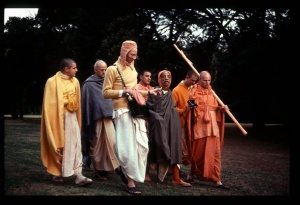SB 10.58.5: Difference between revisions
m (1 revision(s)) |
(Vanibot #0018 edit: make synonym terms in Sanskrit italic in SB - Vanisource) |
||
| Line 1: | Line 1: | ||
{{info | {{info | ||
|speaker= | |speaker=Śukadeva Gosvāmī | ||
|listener=King | |listener=King Parīkṣit | ||
}} | }} | ||
[[Category:Srimad-Bhagavatam - Canto 10 Chapter 58|s05]] | |||
[[Category:Bhagavatam Verses Spoken by Sukadeva Gosvami - Vanisource|105805]] | |||
<div style="float:left">'''[[Srimad-Bhagavatam]] - [[SB 10|Tenth Canto]] - [[SB 10.58: Krsna Marries Five Princesses|Chapter 58: Kṛṣṇa Marries Five Princesses]]'''</div> | |||
<div style="float:right">[[File:Go-previous.png|link=SB 10.58.4]] '''[[SB 10.58.4]] - [[SB 10.58.6]]''' [[File:Go-next.png|link=SB 10.58.6]]</div> | |||
{{RandomImage}} | |||
{{SBnotice}} | |||
==== TEXT 5 ==== | ==== TEXT 5 ==== | ||
<div | <div class="verse"> | ||
paramāsana āsīnaṁ | :paramāsana āsīnaṁ | ||
kṛṣṇā kṛṣṇam aninditā | :kṛṣṇā kṛṣṇam aninditā | ||
navoḍhā vrīḍitā kiñcic | :navoḍhā vrīḍitā kiñcic | ||
chanair etyābhyavandata | :chanair etyābhyavandata | ||
</div> | </div> | ||
| Line 17: | Line 22: | ||
==== SYNONYMS ==== | ==== SYNONYMS ==== | ||
<div | <div class="synonyms"> | ||
''parama''—exalted; ''āsane''—on a seat; ''āsīnam''—sitting; ''kṛṣṇā''—Draupadī; ''kṛṣṇam''—Kṛṣṇa; ''aninditā''—blameless; ''nava''—newly; ''ūḍhā''—married; ''vrīḍitā''—shy; ''kiñcit''—somewhat; ''śanaiḥ''—slowly; ''etya''—approaching; ''abhyavandata''—offered her obeisances. | |||
</div> | </div> | ||
{{SBcollapse}} | |||
==== TRANSLATION ==== | ==== TRANSLATION ==== | ||
<div | <div class="translation"> | ||
Faultless Draupadī, the Pāṇḍavas' newly married wife, slowly and somewhat timidly approached Lord Kṛṣṇa, who sat on an exalted seat, and offered Him her obeisances. | Faultless Draupadī, the Pāṇḍavas' newly married wife, slowly and somewhat timidly approached Lord Kṛṣṇa, who sat on an exalted seat, and offered Him her obeisances. | ||
</div> | </div> | ||
| Line 31: | Line 36: | ||
==== PURPORT ==== | ==== PURPORT ==== | ||
<div | <div class="purport"> | ||
Śrīmatī Draupadī was so devoted to Kṛṣṇa that she herself was called Kṛṣṇā, which is the feminine form of the name, and Arjuna was also called Kṛṣṇa because of his devotion to the Lord. Similarly, the devotees of the modern Kṛṣṇa consciousness movement are often called "the Kṛṣṇas." So it appears that the custom of addressing Kṛṣṇa's devotees by His name has a long history. | Śrīmatī Draupadī was so devoted to Kṛṣṇa that she herself was called Kṛṣṇā, which is the feminine form of the name, and Arjuna was also called Kṛṣṇa because of his devotion to the Lord. Similarly, the devotees of the modern Kṛṣṇa consciousness movement are often called "the Kṛṣṇas." So it appears that the custom of addressing Kṛṣṇa's devotees by His name has a long history. | ||
</div> | </div> | ||
__NOTOC__ | </div> | ||
</div> | |||
<div style="float:right">[[File:Go-previous.png|link=SB 10.58.4]] '''[[SB 10.58.4]] - [[SB 10.58.6]]''' [[File:Go-next.png|link=SB 10.58.6]]</div> | |||
__NOTOC__ | |||
__NOEDITSECTION__ | |||
Revision as of 17:03, 1 December 2017

A.C. Bhaktivedanta Swami Prabhupada
Please note: The synonyms, translation and purport of this verse were composed by disciples of Śrīla Prabhupāda
TEXT 5
- paramāsana āsīnaṁ
- kṛṣṇā kṛṣṇam aninditā
- navoḍhā vrīḍitā kiñcic
- chanair etyābhyavandata
SYNONYMS
parama—exalted; āsane—on a seat; āsīnam—sitting; kṛṣṇā—Draupadī; kṛṣṇam—Kṛṣṇa; aninditā—blameless; nava—newly; ūḍhā—married; vrīḍitā—shy; kiñcit—somewhat; śanaiḥ—slowly; etya—approaching; abhyavandata—offered her obeisances.
Translation and purport composed by disciples of Śrīla Prabhupāda
TRANSLATION
Faultless Draupadī, the Pāṇḍavas' newly married wife, slowly and somewhat timidly approached Lord Kṛṣṇa, who sat on an exalted seat, and offered Him her obeisances.
PURPORT
Śrīmatī Draupadī was so devoted to Kṛṣṇa that she herself was called Kṛṣṇā, which is the feminine form of the name, and Arjuna was also called Kṛṣṇa because of his devotion to the Lord. Similarly, the devotees of the modern Kṛṣṇa consciousness movement are often called "the Kṛṣṇas." So it appears that the custom of addressing Kṛṣṇa's devotees by His name has a long history.